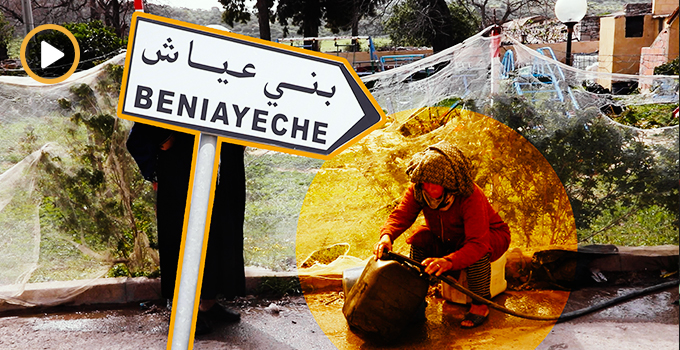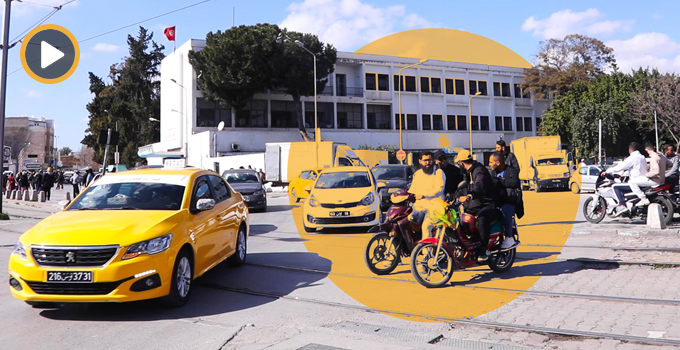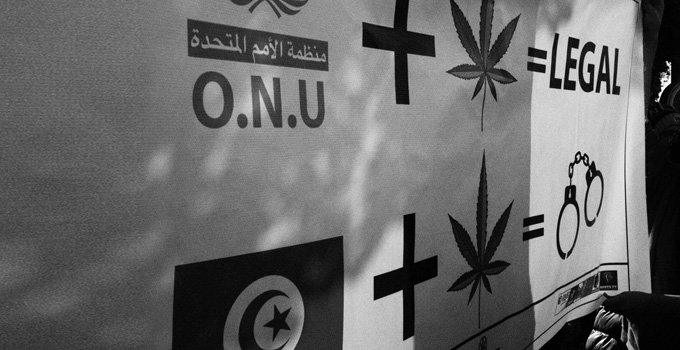In this last week of Ramadan, the regulars of souk Boumendil have reverted to their old ways. Nothing hints that we are still in a phase of gradual deconfinement aside from the occasional passerby wearing a protective mask, sometimes worn pulled down across the chin. In such a crowd the air is hard to breath. Not a sign of physical distancing in sight as people jostle their way down the long encumbered street.

« At least I won’t die of hunger »
Slim, a street vendor set up at the souk’s entrance, calls out loudly to passers by that all of his merchandise is one dinar a piece. Slim sells plastic kitchen utensils. He started back to work on May 4, « but we played cat and mouse » with police, he jokes. It wasn’t until this week that he set up without any trouble: « Today, they’re allowing us here », he says, pleased. The 27-year old vendor doesn’t wear a mask: « If I die, at least it won’t be of hunger », he reasons. Since the beginning of confinement, Slim lives on loans borrowed from friends and acquaintances in order pay for rent and food. Originally from Sbiba (governorate of Kasserine), the young man plans to recover his losses within two months by selling his merchandise at a slightly higher price: « An increase of a few millimes. It’s nothing for the buyer but allows me to make a little more ». Slim hasn’t stocked up on new merchandise. He’s brought whatever remained before the confinement started. « If I sell this merchandise, I’ll buy more even though I know that wholesalers don’t have certain merchandise as a result of supply difficulties since Corona », he tells us.

Slah is another vendor, also from Kasserine. With a stand close to Slim’s, the 59-year old sells batteries and a few repair and maintenance items. Squeezed between two other street vendors, Salah isn’t wearing a mask. His entire business capital amounts to some 200 dinars. « I’ll sell it all and will go back to Kasserine with my wife and eight children for Aid ». As during the confinement period, Salah will seek refuge with close relatives: « We knew we wouldn’t go hungry surrounded by family », he says. Less than a meter away, a young woman also not wearing a mask listens to our conversation, every now and then throwing in a few words of sympathy for Salah. The vendor plans to return to his home town during Aid, but not empty-handed. Consequently, he too has increased the price of merchandise he recently purchased from wholesalers. « As a result of the shortage, wholesalers have slightly increased their prices. I’ve done the same », he explains.

We had to make our way out of the mass of bodies before arriving where cousins Mehdi, 32 years old, and Ahmed, 34, are set up. The two street vendors have a modest stand scattered with toys, mostly firecrackers. While Mehdi chose to return home to Mehdia during the confinement period, Ahmed decided to stay in Tunis and get by as well as he could. « People like us never stop working, otherwise they die ». Another vendor selling women’s clothes nods in agreement. In order to « survive », Ahmed has worked one small job after another. He worked as building custodian and vendor selling vegetables at other markets. « Better to face death than to die of hunger », he says proudly. A police officer appears, interrupting the conversation—not to tell them to wear masks but to order them to not to yell out prices so loudly; their firecrackers are sold at five dinars a packet. « Shut up, aren’t you ashamed? » he barks at Ahmed with a look of disdain. Ahmed seems unsurprised. The officer has barely moved on before Ahmed continues yelling, a scornful smile across his face. The price Ahmed advertises for his merchandise is nonetheless higher than usual. A pack of firecrackers has gone up from two dinars before the confinement to five dinars. « Before, I bought from a wholesaler at ten dinars a packet. Today, it’s 45 dinars. This increase has to be reflected in my prices », he explains. 38-year old Sami says he doesn’t notice an increase in prices. Sami, who wears a mask, is holding two toy pistols. « Like every year, I come to buy toys for the family. This pistol is two times more expensive in stores », he tells us, evidently satisfied to have found a good deal.

Street vendors and storekeepers in the same boat
Tucked between stores selling decorative items and kitchen utensils are several men’s clothing stores. In Ali’s store, there is not a single client. Several men surrounding him are friends who have stopped by to chat about how difficult life is. Not one of them is wearing a mask. « I don’t have enough to cover rent for my business! » he exclaims. Ali says that business was already slowing down before the Covid-19 crisis, the major blow that has resulted in his losses. « People can’t afford to buy themselves new clothes, even at Boumendil » he remarks. Faced with the stagnation of his business, Ali has not purchased new merchandise as he waits to get rid of what he’s had in the store since before confinement. « The supply of merchandise is not a problem. The entire country can come to a halt, but never contraband » he laughs. « You know why? » his friend interjects. « Because it’s protected by high-ranking figures. We manage to get by even when things get rough for them ».
Nor does Riadh, 45, expect any shortage of supplies. Wearing a mask, Riadh sits in front of his store, a lost look in his eyes. Only the questions of passersby regarding the price of one article or another interrupts his daydream. His assistant tends to clients entering the store. Originally from Kasserine, Riadh doesn’t know if he’s going home for Aid. He is, however, sure of one thing: « We are working with the merchandise we had before the crisis. We have enough to hold out for three to four months. The factories in China suspended their production for a long period, and this will have repercussions for our activities between now and the next arrival of Chinese merchandise ». Other economic actors who won’t see the consequences of the crisis right away are business owners in this alley. « They are paid in advance for three to six months; we’ll see how to honor our obligations with them if the crisis continues ». Riadh is set on doing away with clichés that all merchants working in Boumendil sell contraband. « Our business leaseback agreements are in order and most of us work legally », he explains.

Salwa, 40, laughs at the question of legality when it comes to a street vendor who is selling shoes. Accompanied by her three children, she is the only one wearing a mask. While the children examine different shoe models, Salwa asks about prices. « I come here each year to finish up shopping for Aid », she tells us. A teacher, Salwa is drawn to Boumendil for its low prices compared with stores elsewhere. « I can’t afford everything I need in stores, so I finish my shopping here », she says. 30-year old Sana does the same in order to purchase cosmetic accessories at a wholesale store for her and her daughter. « The prices are tempting compared to other places, especially for bulk purchases ». So she buys a number of accessories. Hassen, the 23-year old vendor helps her to make her selection. He’s a store assistant. How did he survive the confinement period without work? To this question, he replies discreetly, « My employer would give me a small amount from time to time in order to make it through ».
Suddenly, a wind rises up and a few drops of rain appear, not enough to scatter the multitude of shoppers who slow down every now and then to check out a good deal. It takes quite a bit of jostling and manoeuvering to make our way out of the market, just about as much as it did to make our way in.





iThere are no comments
Add yours